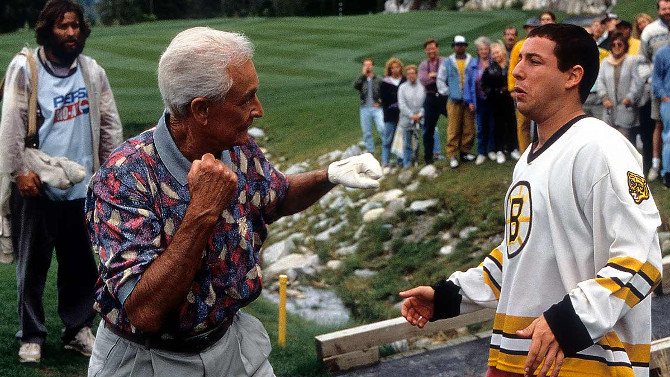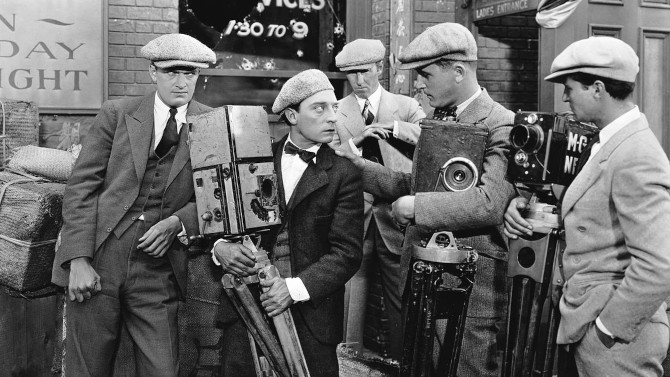
Plights, Camera, Action
Often deemed to be the last classic film made by the great Buster Keaton, The Cameraman (1928) was the final time the silent legend would have anything close to full creative control over one of his own features... as he folded his independent studio to sign with Metro-Goldwyn-Mayer (MGM) – who promptly made him their third highest paid star. Though his future would soon turn very bleak, this first film with the new studio was his own idea.
-
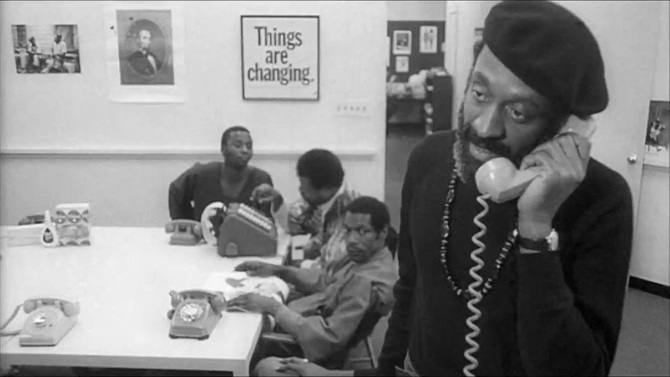
Truth and Soul
Putney SwopeJune 25, 2020We often generalize that old movies are dated. . . and, in some ways, this is true. Sometimes dialogue, fashion, cinematography, and numerous other aspects of a production can come across as old fashioned, yet human beings don't evolve quickly, and a well written romance, drama, comedy, or satire is practically timeless. For an example not related to the film being reviewed today, Charlie Chaplin's cocaine joke from Modern Times (though closing in on 90 years old), is still as funny today as it once was. A satire as rich and relevant today as it was when it was released back in 1969, Putney Swope, written and directed by Robert Downey Sr. (yes, Iron Man's father), holds a comedic magnifying glass up to our present predicament in regards to race and business. Opening with a magnificent overhead shot of New York City, a rather shockingly dressed Southerner (motorcycle gang member meets redneck) arrives in the Big Apple to provide a consult for an executive board of directors of an advertising firm (a large group of middle to aged white men with a token black man - in charge of the music department).
-
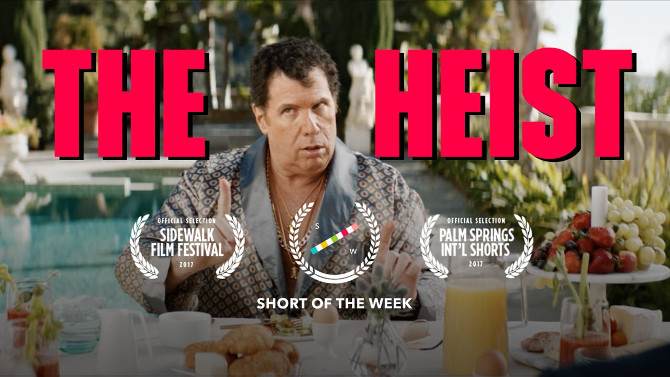
Heist Heist Baby
The HeistJune 4, 2020What does it take to gather the perfect heist team? Judging from the movies we’ve all watched countless times before, I think that we have a pretty good idea of what it takes. Pulling from those same flicks and flipping them on their head for comedic effect, The Heist (2017), directed by Luke Harris, is a four minute short film with slick style, visual flair, and high-octane pacing. Riffing off of the Ocean 11's and Guy Ritchie’s of the world, The Heist finds two handsomely good looking guys, Leo (Shaw Jones) and Pete (Shawn Parsons), pitching an aging mobster, Pauly (Steven Wishnoff) – who is relaxing in a bathrobe, no less, on their plan for the perfect heist, by a lavish swimming pool. . . in what sounds more like a producer’s pitch meeting. Amplifying the stakes of even the most outlandish of the genre (and that is saying something), the pair then start listing their team for this hesitant moneyman (of course, done in a brisk montage style) – from the talented getaway driver and explosive’s expert with a self referential nickname, to the black guy with a cockney accent and “the bad ass who just got his ass kicked but still has the guts to say, ‘Is that the best you got?’”. . . I think you get where they’re going with this gag-filled extravaganza.
-
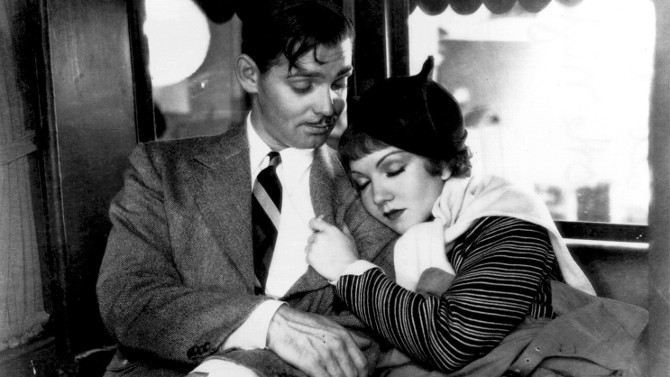
One Night To Remember
It Happened One NightMay 5, 2020It Happened One Night. . . what, you must be wondering? Well, on February 27th, 1935, at the 7th Academy Awards, the aforementioned film became the first ever to win the so-called ‘Big Five’ – Best Picture, Best Director (Frank Capra – his first of three wins for this category in the decade), Best Actor (Clark Gable), Best Actress (Claudette Colbert), and Best Screenplay – in this case, Adapted (Robert Riskin – based on the short story “Night Bus”). . . a rare feat that has only been replicated twice more (with 1975's One Flew Over the Cuckoo’s Nest and 1991's The Silence of the Lambs). Often referred to as the first great romantic comedy as well as the first screwball comedy, all of this success and glory was not guaranteed. Capra, a director at Columbia Studios. . . a name that, at the time, equated to ‘Poverty Row’, was not known as a major studio.
-
Star Pick with Oliver Phelps
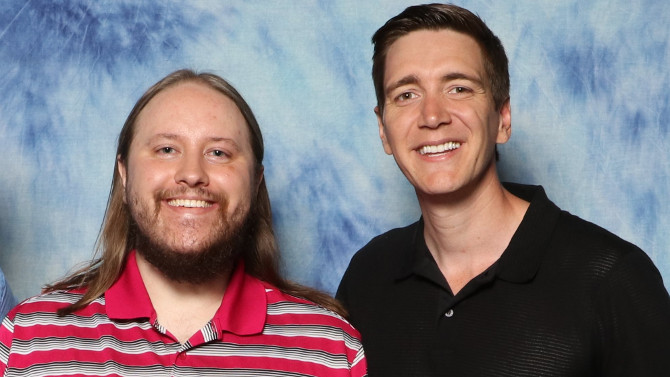 Happy EndingHappy GilmoreApril 1, 2020
Happy EndingHappy GilmoreApril 1, 2020To bring you back to a Star Pick interview I posted a few months ago, actor James Phelps revealed his favourite film to me as his brother prodded him playfully – here is the entertaining retelling: a self professed history buff, as James spoke of his love of the film The Lives of Others (its engrossing story, fascinating characters and intriguing visuals immediately catching his cinematic eye), Oliver chimed in, with a rascally smile – “It’s also because he is a secret Communist”. . . James firing back, “I wouldn’t go that far” – his own face featuring an impish grin. Capturing the same dynamic found in their most famous roles, the pair are like a vaudeville act, finely tuned, James playing the straight man to Oliver’s more overt comedic personality. The famed Weasley twins from the Harry Potter franchise, the pair are known the world over as the scampish older brothers of Ron – roles that provided them with many of the best laughs found throughout the eight movies. Having left you hanging a bit longer than you might have liked, I am sure that many of you have probably been wondering just what Oliver chose as his favourite film.
-
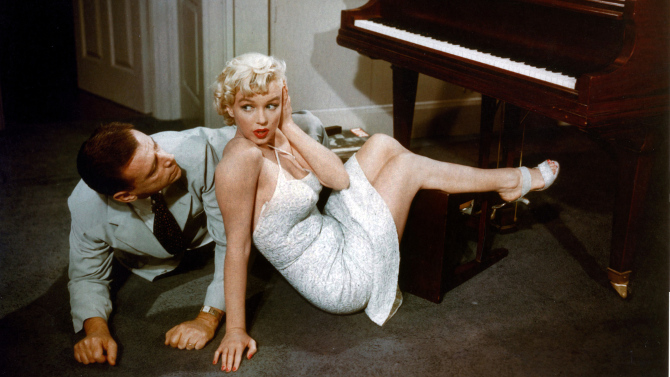
Hot Summer Night
The Seven Year ItchMarch 22, 2020Every once in a while, a scene, or to break it down even further, a moment, forever captures the zeitgeist of the cinema world. . . more long lasting and memorable than the movie ever could be. By now, you may have already guessed that I am talking about the breezy subway grate blowing up Marilyn Monroe’s flowy white dress (cooling her down on a hot summer’s night) in The Seven Year Itch (1955). Funnily enough, the press generated from the scene’s filming in New York City (the excitement of over five thousand fans watching them shoot and then spreading the word. . .along with the risqué-for-the-time photographs that circulated around the world) brought people into theatres to experience a moment that could never truly match up with what was broadcast. . . for the Hays code would never allow the revealing extent shown before the release to be seen on screen – though that is not to say that it is still not a fabulous clip. . . and I’m here to also say, so is the film.
-
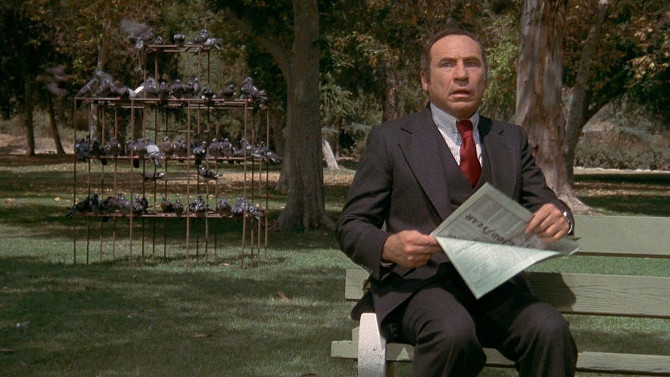
What Could Have Been: High Anxiety
March 17, 2020I will be the first to say that I absolutely love the great Mel Brooks. Secondly, I will also say that I absolutely love Alfred Hitchcock. So, to have a movie in which Mel Brooks satirizes the motion pictures of Alfred Hitchcock just seems like it would be pure twenty-four karat gold. Saying that, I probably went into 1977's High Anxiety with expectations that were just a bit too high. . . which caused me a touch of anxiety. Bringing together many of his usual comedy friends from his other 70s pictures, the plot follows the famed Dr. Richard Thorndyke (Mel Brooks) as he flies out to California for his new job – running the Psycho-Neurotic Institute for the Very, Very Nervous (a fenced complex that holds a sign that reads “Keep In”).

